Davis Schneiderman, Executive Director of the Krebs Center for the Humanities and Professor of English
HUMAN Principal Investigator
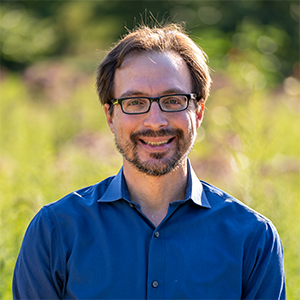 Davis Schneiderman is the Executive Director of the Krebs Center for the Humanities and Professor of English and served as Lake Forest College’s Krebs Provost and Dean of the Faculty from 2017-2023, and prior to that served as Associate Dean of the Faculty from 2013-2017.
Davis Schneiderman is the Executive Director of the Krebs Center for the Humanities and Professor of English and served as Lake Forest College’s Krebs Provost and Dean of the Faculty from 2017-2023, and prior to that served as Associate Dean of the Faculty from 2013-2017.
Dr. Schneiderman leads Krebs Center in its mission to promote excellence in humanities teaching and scholarship, as well as public recognition of the humanities, and the Center’s initial emphasis on the humanities in the age of AI marks the College’s commitment to the continuing relevance of humanistic study and inquiry.
Dr. Schneiderman is the author or editor of more than 10 books and his work focuses on areas of contemporary interest, including the humanities and artificial intelligence, copyright and digital plagiarism, remix culture, and the technological innovations emerging from the interplay of avant-garde and mainstream practices. He is currently working on several projects related to the author William S. Burroughs, including editorial work for Cambridge University Press.
He has read and performed around the country and world, including at the Ukrainian Embassy in Washington D.C, the University of London Institute in Paris, and in venues in Germany, Denmark, Belgium, and Morocco, among others. His journalism and interviews have appeared in numerous publications including Harpers.org, The Chicago Tribune, and The Iowa Review. He was a long-time contributor forThe Huffington Post,and has interviewed John Waters, Regina Taylor, and Aleksandar Hemon, among many others.
Rachel Whidden
Associate Professor of Communication
HUMAN Project Director
 Rachel Whidden is an Associate Professor in the Department of Communication at Lake Forest College. As Chair of the Academic Honesty Judicial Board, Rachel first began exploring the ethical dimensions of generative AI use in education, particularly regarding its impact on authorship and originality. Having taught and researched topics ranging from ancient rhetoric to contemporary scientific controversies, Rachel brings to the HUMAN grant her expertise in analyzing how language and framing influence public perceptions and policy.
Rachel Whidden is an Associate Professor in the Department of Communication at Lake Forest College. As Chair of the Academic Honesty Judicial Board, Rachel first began exploring the ethical dimensions of generative AI use in education, particularly regarding its impact on authorship and originality. Having taught and researched topics ranging from ancient rhetoric to contemporary scientific controversies, Rachel brings to the HUMAN grant her expertise in analyzing how language and framing influence public perceptions and policy.
Ben Zeller
Professor of Religion
HUMAN Project Director
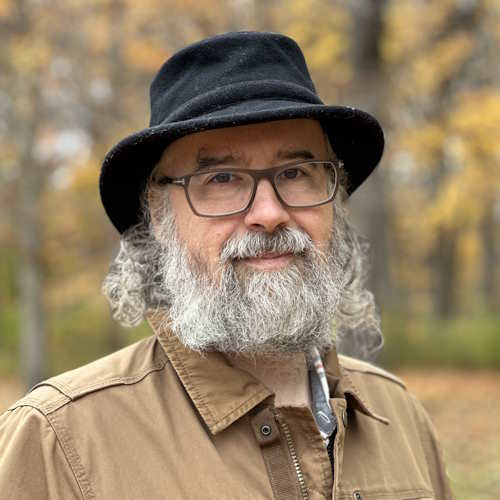 Ben Zeller is Professor of Religion. He has long been interested in the intersection of religion and science, having published several books and articles on topics ranging from science and new religious movements, to religion and belief in UFOs, to religion and technology. He has also taught and published on religion and science fiction, and has been fascinated by how both religion and science fiction trace the limits of humanity and the interface between human, superhuman, nonhuman, and the technological. In addition to serving as Project Director, Zeller is teaching a new class on Religion, SciFi, AI, and Non-Human, looking at questions of what is means to be a person, and the nature of the self, consciousness, and the supernatural within the context of the rise of A.I.
Ben Zeller is Professor of Religion. He has long been interested in the intersection of religion and science, having published several books and articles on topics ranging from science and new religious movements, to religion and belief in UFOs, to religion and technology. He has also taught and published on religion and science fiction, and has been fascinated by how both religion and science fiction trace the limits of humanity and the interface between human, superhuman, nonhuman, and the technological. In addition to serving as Project Director, Zeller is teaching a new class on Religion, SciFi, AI, and Non-Human, looking at questions of what is means to be a person, and the nature of the self, consciousness, and the supernatural within the context of the rise of A.I.
Roshni Patel
Assistant Professor of Philosophy
HUMAN Book Club Convener
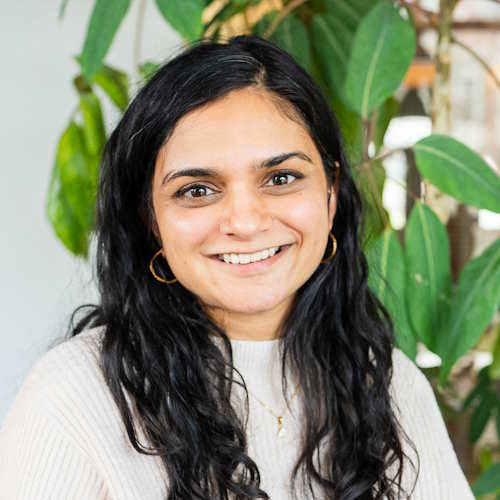 Roshni Patel is an assistant professor of Philosophy. Her research is most centrally in Indian Buddhist philosophy, with particular focus on early traditions related to the Pāli canon and the Madhyamaka or Middle Way tradition. She also does research in 20th century continental philosophy (especially the figure of Martin Heidegger), philosophy of emotion, and feminist philosophy. Her current book project reflects on the Buddhist concept of compassion in conversation with Feminist Care Ethics to develop the ethical value of the internal disposition of care and compassion.
Roshni Patel is an assistant professor of Philosophy. Her research is most centrally in Indian Buddhist philosophy, with particular focus on early traditions related to the Pāli canon and the Madhyamaka or Middle Way tradition. She also does research in 20th century continental philosophy (especially the figure of Martin Heidegger), philosophy of emotion, and feminist philosophy. Her current book project reflects on the Buddhist concept of compassion in conversation with Feminist Care Ethics to develop the ethical value of the internal disposition of care and compassion.
Roshni’s philosophical reflection on technology largely stems from Heidegger’s considerations of how technology configures the human in a historically contingent way. While modernity is hyperbolic in its manner of revealing this, technology is revelatory of our unbounded constitutions. Roshni’s work has drawn on Buddhist philosophy to consider the ethically relational possibilities of an otherwise spooky state of possible dispossession in modern technology.
HUMAN Steering Committee
Daw-Nay Evans
Associate Professor of Philosophy and African American Studies
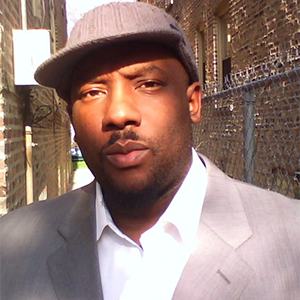 Daw-Nay is an Associate Professor of Philosophy and African American Studies at Lake Forest College. He primarily works in nineteenth- and twentieth-century European philosophy, Africana philosophy, and the philosophy of race and racism. Having taught numerous courses on ethics and served as the Director of the Ethics Center at Lake Forest College, he is well poised to think at the intersection of humanities and technology, especially as it concerns AI. Today, the philosophy of AI is brimming with ethical, metaphysical, and epistemological questions: Should self-driving cars have ethical constraints? Is predictive policing racist? Should robots have rights? Should students be allowed to utilize AI systems such as ChatGPT to complete assignments? Does a world dominated by AI neutralize human intuition and our experience of emotions such as wonder and uncertainty? Can an AI system have free will? Can robots think for themselves?
Daw-Nay is an Associate Professor of Philosophy and African American Studies at Lake Forest College. He primarily works in nineteenth- and twentieth-century European philosophy, Africana philosophy, and the philosophy of race and racism. Having taught numerous courses on ethics and served as the Director of the Ethics Center at Lake Forest College, he is well poised to think at the intersection of humanities and technology, especially as it concerns AI. Today, the philosophy of AI is brimming with ethical, metaphysical, and epistemological questions: Should self-driving cars have ethical constraints? Is predictive policing racist? Should robots have rights? Should students be allowed to utilize AI systems such as ChatGPT to complete assignments? Does a world dominated by AI neutralize human intuition and our experience of emotions such as wonder and uncertainty? Can an AI system have free will? Can robots think for themselves?
Kim Hazlett
Director of the Library
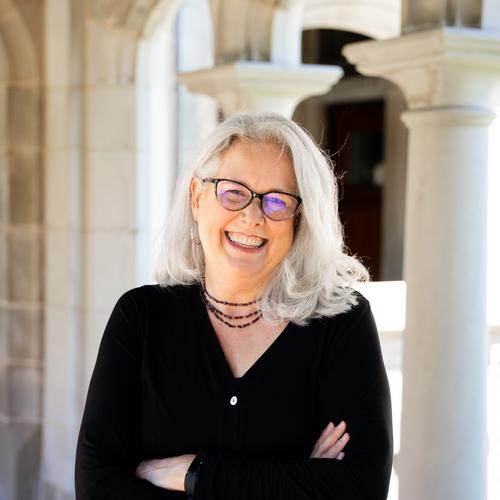 Kim Hazlett joined the Donnelley Library at Lake Forest College in 2014. She has held positions in multiple areas of the library, including access services, reference, instruction, and electronic resources. Kim became the Director of the Donnelley and Lee Library in 2023. She holds a Bachelor of Arts in Management and a Master of Library and Information Sciences. Kim is passionate about fostering a culture of inquiry and facilitating access to diverse resources for research endeavors. Her areas of interest lie in the impact of library services on student success and the intersection of artificial intelligence and information management. She is excited to work with researchers to explore innovative applications of AI in education and scholarly communication.
Kim Hazlett joined the Donnelley Library at Lake Forest College in 2014. She has held positions in multiple areas of the library, including access services, reference, instruction, and electronic resources. Kim became the Director of the Donnelley and Lee Library in 2023. She holds a Bachelor of Arts in Management and a Master of Library and Information Sciences. Kim is passionate about fostering a culture of inquiry and facilitating access to diverse resources for research endeavors. Her areas of interest lie in the impact of library services on student success and the intersection of artificial intelligence and information management. She is excited to work with researchers to explore innovative applications of AI in education and scholarly communication.
Justin Kee
Instructor of Politics and Philosophy
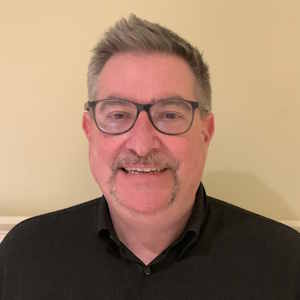 Justin began his career at a computer networking startup company in the early 1990s. He began work as a project manager and ultimately became director of information technology, where he oversaw hundreds of projects, building out the core network infrastructure for various corporate, governmental, educational and military clients. After the dotcom crash he returned to school, earning a degree in computer science from Northwestern University and a law degree from Loyola University Chicago School of Law, with a focus on intellectual property law. He has taught computer programming at Northwestern’s School of Education and Social Policy CTD program. Justin is currently in his seventh year of teaching classes at Lake Forest College. His courses cover First Amendment law, computer crime, the laws of war, and now, artificial intelligence.
Justin began his career at a computer networking startup company in the early 1990s. He began work as a project manager and ultimately became director of information technology, where he oversaw hundreds of projects, building out the core network infrastructure for various corporate, governmental, educational and military clients. After the dotcom crash he returned to school, earning a degree in computer science from Northwestern University and a law degree from Loyola University Chicago School of Law, with a focus on intellectual property law. He has taught computer programming at Northwestern’s School of Education and Social Policy CTD program. Justin is currently in his seventh year of teaching classes at Lake Forest College. His courses cover First Amendment law, computer crime, the laws of war, and now, artificial intelligence.
David Sanchez-Burr
Associate Professor of Art
 David began his experimental sound and visual work in Richmond, Virginia while studying at Virginia Commonwealth University. He has exhibited and performed his work widely at museums, art centers, cultural spaces, and many non-traditional venues and locations nationally and internationally. David interweaves pedagogy, curatorial projects, and his own work to examine the social, economic, and cultural implications of technology in the 21st century. He has received grants and funding from The Nevada Arts Council, The Media Arts Project, The International Symposium for Electronic Arts, The Mellon Foundation, the Art Production Fund and the National Endowment for the Arts. David Sanchez Burr has taught at the University of Nevada, Las Vegas, University of Maryland, University College, and New Mexico Highlands University. He is an Associate Professor of Art and Chair of The Art and Art History Department at Lake Forest College in Illinois.
David began his experimental sound and visual work in Richmond, Virginia while studying at Virginia Commonwealth University. He has exhibited and performed his work widely at museums, art centers, cultural spaces, and many non-traditional venues and locations nationally and internationally. David interweaves pedagogy, curatorial projects, and his own work to examine the social, economic, and cultural implications of technology in the 21st century. He has received grants and funding from The Nevada Arts Council, The Media Arts Project, The International Symposium for Electronic Arts, The Mellon Foundation, the Art Production Fund and the National Endowment for the Arts. David Sanchez Burr has taught at the University of Nevada, Las Vegas, University of Maryland, University College, and New Mexico Highlands University. He is an Associate Professor of Art and Chair of The Art and Art History Department at Lake Forest College in Illinois.
Tessa Sermet
Assistant Professor of French
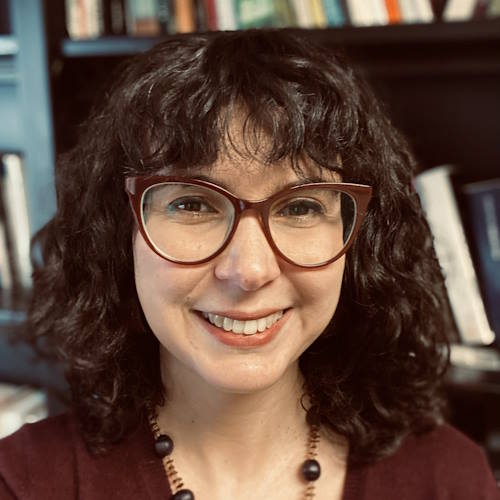 Tessa Sermet is an assistant professor of French. Her research is concerned with the intersection of utopia and science fiction in French and Francophone contemporary literature, film, and graphic novels. A second, and equally important intersection of her research interests is in gender studies and science fiction, particularly when connected to issues of labor, reproduction, and sexuality. In spring 2025, she will teach a course related to HUMAN and entitled “Decoding the Feminine: A.I., Robots, & Gender.”
Tessa Sermet is an assistant professor of French. Her research is concerned with the intersection of utopia and science fiction in French and Francophone contemporary literature, film, and graphic novels. A second, and equally important intersection of her research interests is in gender studies and science fiction, particularly when connected to issues of labor, reproduction, and sexuality. In spring 2025, she will teach a course related to HUMAN and entitled “Decoding the Feminine: A.I., Robots, & Gender.”
HUMAN Fellows
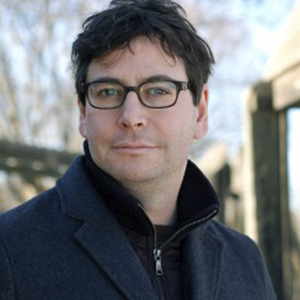 Josh Corey
Josh Corey
Lake Forest College Press AI Editions
Lake Forest College Press, with the assistance of HUMAN participants, will produce new editions of classic Chicago-focused texts in the public domain, using AI-assisted analyses to identify themes of class, gender, and racial dynamics in the writings of significant Chicago-based writers like journalist Ida B. Wells, political activist Lucy Parsons, and pioneering social worker Jane Addams. The project will use generative AI to conduct a) semantic analysis to identify recurring themes (the NLP can determine frequency), b) pattern recognition to identify structure and style, c) contextual analysis to compare the work with historical documents of the period (news articles, letters, etc.) to identify external influences, d) intertextual analysis to compare the texts with other relevant literary works of the period, e) visual representations to express aspects of the texts in sentiment graphs, word charts, etc., among others.
 Mel Rovner
Mel Rovner
Anti-Monumental
"Anti-Monumental" works with AI to critically evaluate Chicago’s public history monuments, and to propose corrective augmentations or new models that better represent the complicated history of race, conquest, and representation in Chicago. The project responds to the city’s commission – the “racial healing and reckoning project” – tasked with evaluating over 500 Chicago monuments. Though seemingly singular, each monument is entangled in complicated and far-reaching histories of exploitation, extraction, and displacement – histories without physical commemoration in the contemporary city. In conversation with an LLM, the project begins to unravel the histories underpinning monuments central to Chicago’s public narrative, to analyze the contemporary public discourse surrounding their preservation or plans for removal, and to connect them to alternative histories of being and belonging. The project experiments with generative AI’s capacity for reading images, through DALL-E, for example, to question identified monuments, and to re-envision them as “anti-monuments” to Chicago’s diverse, complicated, difficult, and hidden histories.
 David Sanchez-Burr
David Sanchez-Burr
The Passage is Ours to Alight: The Emergence of New Sentience
This research project combines Music/Sound Art, Astrophysics, Visual Art, and Artificial Intelligence via an installation space that allows interaction with AI through movement and sound, imagining a theoretical communication with AI in ways that foresee it as a new sentient species. The goal of this project is to look at alternative means of contact with AI. Our goal is to make this interactive experience illustrative of the creative spirit while at the same time, relational to our space and time in the universe. Using AI-generated visuals and sounds, as well as sensors and sound amplification, the room will make AI capable of detecting the presence of visitors and open a dialogue through interactions within the space.
 Dan Schwartz
Dan Schwartz
Generative AI and the Future of Fine Arts
This project examines the role of the human – or lack thereof – in making art, culminating in a fine arts showcase created by the participants of MUSC 285: Creative Arts Entrepreneurship (Fall 2024). It explores the philosophical aspects of art, focusing on ethics, authenticity, and accessibility. The event will discuss the project and its development leading up to the showcase.
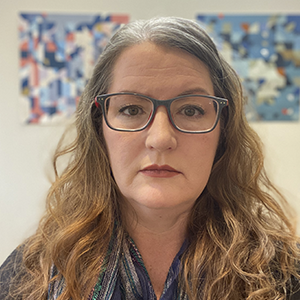
Tracy Taylor
Ars Machina Vitae: A Reproductive Odyssey
“Ars Machina Vitae: A Reproductive Odyssey” is an interactive art piece that merges narrative storytelling with advanced AI technology, offering a “choose your own adventure” experience that delves into the nuanced journeys of individuals facing infertility. Developed using cutting-edge AI tools, including ChatGPT for narrative generation and Midjourney for visual design, this project represents a synthesis of human creativity and artificial intelligence. Participants are invited to navigate the lives of five distinct characters, each confronting unique challenges related to reproductive technologies, societal expectations, and personal dilemmas.

Rachel Whidden
Visualizing Rhetoric in AI Bias: Analyzing Corporate Apologies and Public Responses
The rapid development and deployment of artificial intelligence (AI) technologies have led to significant benefits across various industries. However, these technologies also have generated controversies, particularly concerning issues of bias and discrimination embedded within AI algorithms. Major tech companies, including Google, Microsoft, Facebook, and others, have found themselves at the center of these controversies, often necessitating public apologies and detailed explanations. For this project, I analyze media coverage and public communication surrounding specific incidents of AI bias involving these tech giants. By examining the timeline of events, company responses, public reactions, and outcomes, I identify the rhetorical strategies employed in these corporate apologies and explanations. A key focus of this analysis is how companies frequently place blame on algorithms, effectively severing the human role in generating the data that informs these algorithms. The project will culminate in an interactive timeline that visually represents the sequence of events, company responses, and public reactions for each AI bias controversy, and a data visualizations representing and analyzing the rhetorical strategies and public perceptions related to AI bias controversies.

